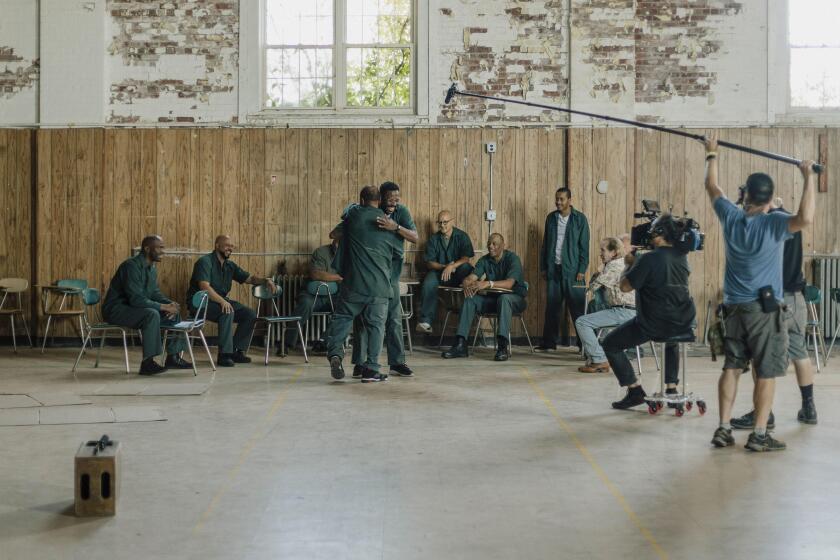A timely period piece
The relevance of Arthur Miller’s post-World War II drama “All My Sons” is hard to miss at a time, almost 60 years since its Broadway premiere, when the United States is engaged in a foreign war rife with charges of faulty military equipment and civilian profiteering. The play, which opened at the Geffen Playhouse on Wednesday in a new production starring Len Cariou and Laurie Metcalf, is something of a period piece. But the quality of its writing hasn’t tarnished, its moral issues haven’t aged, and its tragic events can still pack a wallop.
The wallop did not arrive in its entirety on opening night in director Randall Arney’s respectable staging, which is good enough that you wish it were better. Metcalf is sensational as Kate Keller, the grim-faced mother whose inability to accept the death of one of her sons in the war has locked her in a realm of desperate fantasy. Cariou, who plays her husband, Joe, the blue-collar factory owner with a terrible secret, is big and forceful, as the role demands, but unfortunately doesn’t seem enough like a guy who ever got his hands dirty, as Miller describes him. A great actor (unforgettable on Broadway as Sweeney Todd, the Demon Barber of Fleet Street), Cariou is always fun to watch, but here he could stand to be rougher around the edges.
For the record:
12:00 a.m. April 28, 2006 For The Record
Los Angeles Times Friday April 28, 2006 Home Edition Main News Part A Page 2 National Desk 0 inches; 28 words Type of Material: Correction
“All My Sons”: A review of the Geffen Playhouse production of “All My Sons” in the April 21 Calendar section misspelled actor Morgan Rusler’s last name as Russler.
Neil Patrick Harris, who plays slick wisecracker Barney on the TV sitcom “How I Met Your Mother,” is certainly cast against type as Joe’s surviving son, Chris, whom Miller envisioned as a young man nearly as physically imposing as his father. “I’m a pretty tough guy,” he says at one point. We’re not so sure. The tension between the brash patriarch and his quietly doubting son is missing a few degrees of perspiration on the way to Chris’ eventual, climactic rebuke of his father and all that he stands for.
But while the casting raises questions, the play is so solidly built that it manages to yank us still into the thought-provoking spiritual crisis Miller believed he felt “in the air” at the same time the nation was celebrating its victory over the Axis powers.
The action takes place on a single set, the Kellers’ front lawn that designer Robert Blackman has made into a beautiful vision of a Midwestern Eden, intentionally at odds with the bitter truths that are to be revealed there. Daniel Ionazzi’s softly lighted blue and gray clapboard house surrounded by trees looks like it could only be home to a nice American family, and, in a way it is -- or was. War changes things.
Miller adroitly fuses past and present, making it all too clear fairly quickly that the ordinary pleasantries on view are a patina obscuring a more complicated and troubling set of facts. As Joe and his neighbors (Morgan Russler as an unhappy doctor and Liam Christopher O’Brien as an astrology-gazing clod) make small talk on an August morning, the imminent arrival of Ann (Amy Sloan), the girlfriend of his missing airman son, Larry, has the household in a state of anticipation and foreboding. It’s been 3 1/2 years since Larry’s plane disappeared, and no one has seen Ann since.
We soon learn that Ann’s father, Steve, is doing time in prison for fobbing off cracked cylinder heads to the Army that resulted in the deaths of 21 pilots. But Steve was Joe’s partner, and many in the neighborhood wonder why Joe isn’t in prison as well. Meanwhile, Chris is planning to wed Ann, who, unlike Kate, believes Larry is dead. Because she cannot imagine the world without Larry coming back, Kate cannot abide the thought of Ann marrying Chris. Nor can Ann’s brother George (Chris Payne Gilbert), now a lawyer, who is also about to arrive with some new information implicating Joe in the fatal foul-up at the plant.
People forget that Miller, the great moralist, could be funny, and this production gets right many of the laughs that are laced as fitful comic relief through the otherwise somber story line. But the mood abruptly shifts to terror and pity each time one of the characters scratches closer to the truth of what happened on that fateful day when the cracked cylinder heads went out.
When Metcalf makes her entrance in a shapeless gray dress and church lady hairdo, her every deliberate movement shoring up a wall of denial about to crack, the stage comes alive with a frightful power. The dark side of the Kellers’ placid existence turns in our direction, and we realize that beneath her bland exterior she is holding every other actor, as well as the audience, by the throat.
This, Miller shows us, is what life (and death) can do to you. When Kate overrules the common sense of those in her midst who insist she face the facts about Larry, she says she is just like every other mother: “In the dark of night they’re waiting for their sons.”
Her stubbornness to accept the truth is so extreme as to become almost comic, but it is poignancy that she conveys in the end despite how mean the world has made her.
While Kate’s suffering, so palpable in Metcalf’s chilling performance, is part of what Miller wants us to feel, his larger subject is to be found in Joe’s abnegation of responsibility to his fellow man. A Depression-era working stiff who has risen by his wits and will to become a successful businessman, Joe has failed God’s testing of him. Given a choice between financial ruin and the possibility of endangering the lives of servicemen, he chose the latter, reassuring himself that he did it for his family.
A survivor, Joe has found a way to live with his lie until now -- the moment that his dead son reprimands him from the grave. And we feel for him too, because he is not some diabolical villain but an average guy who wasn’t strong enough to make a tough choice and rise above the money.
In “All My Sons,” his first successful play, Miller conjured a world not just broken by war and economic hardship but by fissures in community, the inability of his fellow citizens to see we are all in this together. “There is something bigger than the family,” Kate tells Joe in Act 3, as the plot tightens around his belated understanding that all those dead pilots were his sons too.
If every element in the Geffen production is not perfect, enough goes right to make the evening worthwhile. If Harris never quite finds the emotional center of Chris, his character’s wounds are plain enough, and as his sweetheart Ann, Sloan is every inch a convincing WWII beauty whose own choice between her love for Chris and her loyalty to her brother George is wrenching indeed.
*
‘All My Sons’
Where: Geffen Playhouse, 10886 Le Conte Ave., Westwood
When: 7:30 p.m. Tuesdays through Thursdays, 8 p.m. Fridays, 4 and 8:30 p.m. Saturdays, 2 and 7 p.m. Sundays
Ends: May 21
Price: $35 to $69
Contact: (310) 208-5454,
(213) 365-3500
Running time: 2 hours, 20 minutes
More to Read
The biggest entertainment stories
Get our big stories about Hollywood, film, television, music, arts, culture and more right in your inbox as soon as they publish.
You may occasionally receive promotional content from the Los Angeles Times.






